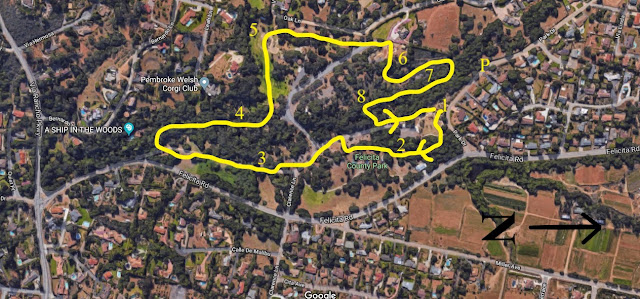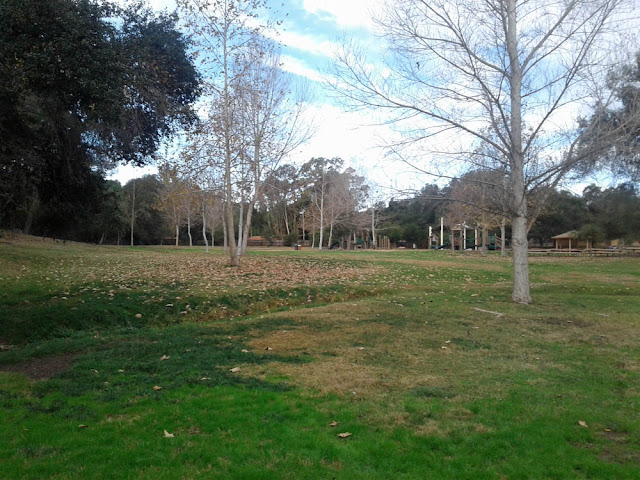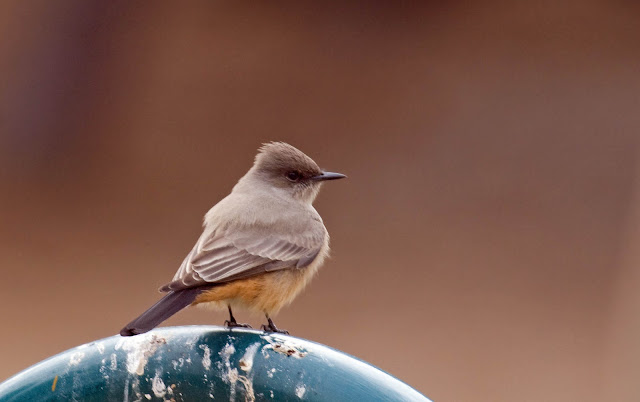Just off Hwy 15 in Escondido, in San Diego's North County, is Felicita County Park. It is a seldom-birded but lovely hillside park covered in sycamore and ancient oak woodlands. It is a compact 53 acres with two small streams running through it. It has typical southern California oak woodland birds such as Acorn and Nuttall's Woodpeckers, Mourning Doves, Anna's Hummingbirds, Western Bluebirds, Lesser Goldfinches, Red-shouldered Hawks, White-breasted Nuthatches, Hutton's Vireos, Oak Titmouses, Black Phoebes, and California Towhees.
The
park's official website is here.
And here is a map of the west half of San Diego County with Felicita Park marked.
Getting there: From downtown San Diego it is about 28 miles north on Hwy 15 to Escondido. South of town get off the freeway at Exit 27, Via Rancho Parkway. Turn left (west) on E Via Rancho Pkwy and continue 1.1 miles, then turn right (north) onto Felicita Rd. Go 0.4 miles to the park Entrance on the left and park in the parking lot.
$3 Parking. Hours: Gates open at 9:30 am for parking, however, pedestrians may access via the north fence line sunrise to sunset. Restrooms may not be open until 9:30 am.
Map Navigation: 742 Clarence Lane, Escondido, CA 92029. However...
Early arrival Parking Notice/Warning: Before 9:30 am, if the park is not open yet (preferred), follow the above directions and continue 0.2 miles north on Felicita Rd and turn left onto Park Dr. Drive 0.1 miles to the curve and turn around and park on the narrow residential shoulder where there is room for only 2-3 cars, right in front of the "Begin No Parking" sign. [This could change in the future; be sure to obey signs.] At this time this is the only nearby parking and access from outside the park.
Free Parking here. As always, do not leave any valuables visible in your car.
As noted above, the parking lot gates don't open until 9:30 am. So if you arrive at dawn and park outside on the quiet neighborhood street (Park Drive) and walk in, you can have the park mostly to yourself for the first couple of hours after sunrise. There will be a few dog walkers and maintenance workers you may have to share with. Two hours is probably all that is needed to stroll a mile-and-a-half of trails through and around the park and see all the birds.
 |
| Parking is the biggest concern before the park opens. For this photo I am standing at a pedestrian entry (not wheelchair accessible) on Park Drive, on the north side of Felicita County Park, facing west. You may be able to make out my car 200 feet down the road, parked on the edge of this narrow, but very low-trafficked street. No parking is allowed right here on this nice wide shoulder, of course. This is the only parking spot outside the park, with room for 3 cars, barely off the pavement. And you'll have to walk down the street part ways. |
Have I covered the parking situation well enough for you to decide whether early arrival is for you? Good. Then on to the birds....
How seldom-birded is Felicita County Park? Well, there were only 5 eBird checklists submitted in all of 2017--two of those were for the Escondido Christmas Bird Count in January and then again in December. No one reported birds between January 8th and November 29th of 2017. If it weren't for a Brewer's Sparrow and Gray Flycatcher found this past December 28th, there probably wouldn't be the additional 4 checklists added since then, either. It has been almost unbirded between April and October, especially in recent years. If you visit Spring though Autumn you are almost assuredly going to add new species to the only 89 species on the eBird Hotspot list sighted so far. [eBird
bar chart is here.]
 |
| Birding map for Felicita County Park (see text). North is to the right. Click to enlarge. |
Where to bird: The above satellite image displays the birding path I take. Enlarge to better view, but you can make out Felicita Road snaking across left-to-right (north is right on this map). The yellow "P" in the upper right indicates the parking location outside the park on Park Drive for early morning birding.
Enter the Park through the pedestrian entry on the north fence line on Park Drive ("1" on map). Cassin's Kingbirds twitter over the residences across the street, a distant Northern Mockingbird is singing. Anna's Hummingbirds buzz in the edge landscaping. Crows fly over noisily.
 |
| Picnic Area 6. Covered playground and artificial turf at north end of park. |
Passing the covered playground in the photo above you proceeding on to map label "2" where you come to the edge of one of the small creeks. Yellow-rumped Warblers fly about the tops of the Eucalyptus trees lining the creek. A Common Yellowthroat calls from the weedy wet edge. A family of Bewick's Wrens crawls through the low branches of a small, dense tree.
 |
| Eurasian Collared-Doves have invaded the residential areas along the park's boundaries. |
Follow the main entry road past the entry booth and head south on an abandoned park road ("3" on map). A family of Western Bluebirds sallies out into the meadow. Hutton's Vireos buzz in one of the oaks lining the road. A couple of Oak Titmouses chatter. A White-breasted Nuthatch works over the branches with nasal calls. Acorn Woodpeckers whoop it up in the taller oaks. Nuttall's Woodpeckers rattle. House Finches chirp from high up in one of the tall trees. A Spotted Towhee trills from the top of the brambles. A harsh "check" reveals a Hermit Thrush in a tangle of trees.
 |
| Abandoned road through southeast end of park. |
At the end of the abandoned road you will come to a bridge over the creek to the west. Cross and head north on the west side of the stream. ("4" on map.) If you are stealthy you may spot a Great Egret before it spies you. A harsh rattle tells you that the Belted Kingfisher is flying away before you spotted it.
 |
| A stream separates the east and west half of the park. See the Egret and Mallard? |
After a short distance head up the hill to the picnic areas.
 |
| A Great Egret enjoys the stream and little waterfall. |
 |
| Hard to see against the bright sky, a Belted Kingfisher calls the creek home during this past winter. |
 |
| Picnic area 2. The southwest corner is the highest part of the park. |
Picnic Areas 1-5 are in view of the above photo ("5" on map). A museum and stage is visible, too. A flock of sparrows feeding on the ground contains White-crowned and Lark Sparrows, as well as a couple of Dark-eyed Juncos. A Black Phoebe flies out, grabs an insect, and returns to its perch with a tail bob and loud chip. A flock of Lesser Goldfinches whine and whistle from a sweetgum tree.
 |
| A Say's Phoebe finds a practical use for the playground equipment. |
 |
| A wintering Orange-crowned Warbler |
 |
| A Cooper's Hawk enjoys the park for her own nefarious devices. Those little winter sparrows and finches taste like chicken! |
Follow the west fence line north until you come to the Chapel area ("6" on map). From the east side of the Chapel parking lot a trail takes off to the north into the sage scrub habitat.
A group of Purple Finches darting in and out of the parking lot trees is rather unusual for this lowland area. The loud "chink" call lets you know a California Towhee is hiding in the brush. A rising short whistle calls your attention to a Phainopepla. A repeated kicking call comes from a distant Red-shouldered Hawk.
Keep to the left until the trail finally descends to the creek ("7" on map). Then follow the creek back to a footbridge ("8") on map). Then make your way to the exit.
 |
| Upper Knoll. A trail leads north from the chapel on the west side of the park through a bit of native sage scrub habitat. |
 |
| A pair of Phainopeplas spent the winter in the less-manicured part of the park. |
Notice that this route circled the park, but didn't cover all the roads and trails on both sides of the streams. There is more to explore here if you wish.




















